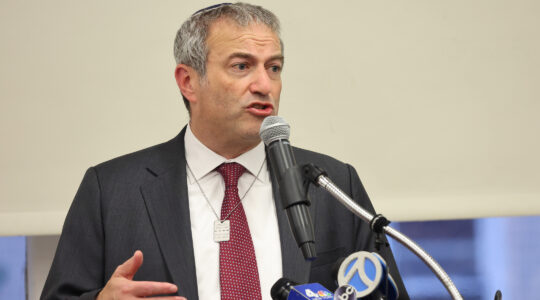TORONTO (JTA) — Anti-Semitic activities in Canada have risen to their highest level in 25 years, according to a new report. B’nai Brith Canada’s 2006 Audit of Anti-Semitic Incidents indicates that 935 incidents were reported to the organization’s League of Human Rights last year. Almost two-thirds were categorized as harassment, one-third as vandalism, and about 3 percent as violence.Incidents include physical assaults, threatening phone calls, Internet hate-mongering, synagogue vandalism, Holocaust denial and a school firebombing in Montreal. The overall number is about 13 percent higher than in 2005, double the tally of five years ago and four times higher than it was 10 years ago.The incidents also are becoming more personally threatening, said Frank Dimant, B’nai Brith Canada’s executive vice president, who concludes that more members of Canada’s 375,000-strong Jewish community feel targeted than ever before.”The acts of harassment and violence are increasing. It’s going beyond ordinary vandalism,” he said. “That means that more individuals are feeling personally threatened, and that’s a frightening experience.”The figures show that 49 cases involved a workplace setting, 118 involved private homes and 54 involved school settings across Canada.Nearly half of the reported events occurred in Toronto, which is home to nearly half of the country’s Jews. Another 25 percent occurred in Montreal. But there were incidents in almost every Canadian region in 2006.In the Atlantic provinces, for example, white supremacist flyers were surreptitiously placed into a traveling Anne Frank memorial exhibit, and a violent anti-Semitic computer game was played at a public high school. In Manitoba, Nazi-themed graffiti was spray-painted across a 50-foot stretch on a public walkway.In one case mixing road rage with racism, a Jewish motorist in Toronto was assaulted by a driver who shouted that “a pig-nose Jew should not be driving,” and threatened to kill him.In another case, a Toronto woman who was being harassed in an anti-Semitic way in a park called B’nai Brith’s 24-hour “anti-hate hotline” on her cellphone. The person who answered notified police and stayed on the phone with her until she was safely out of the park.Reported incidents like these represent only about 10 percent of such activity, B’nai Brith officials contend.The report also documents a dramatic upsurge of anti-Semitic activity around Israel’s war with Hezbollah last summer. Events in the Middle East are a “global trigger phenomenon” for acts of anti-Jewish hate in Canada and elsewhere, the authors conclude.According to the B’nai Brith statistics, the largest known group of perpetrators — who claimed responsibility for 56 incidents — were persons identifying themselves as being of Arab or Muslim descent.For Dimant, one of the most troubling episodes involved a malicious whisper and e-mail campaign against Bob Rae, a candidate in last year’s federal Liberal leadership convention, urging delegates not to vote for him because his wife is Jewish.”Bob Rae’s team said there was a constant anti-Semitic campaign. The e-mail was just the tip of the iceberg,” Dimant said. “When that kind of anti-Semitism enters into a legitimate political arena, there’s no guarantee that it won’t happen within other political parties” and target other groups of people.While the Canadian Jewish Congress does not release statistics on anti-Semitic activities, it carefully monitors such behavior. “There is no question that 2006 saw a marked increase in anti-Semitic activities in Canada,” Congress CEO Bernie Farber said.”We’ve also seen an increase in what I would describe as suspicious behavior, such as making probing phone calls and the photographing of Jewish facilities,” Farber said, adding that harassment in the workplace and threats against Jewish leadership and institutions — involving bomb hoaxes and similar warnings — also increased in 2006.In response to the numbers, B’nai Brith’s League for Human Rights has penned a Victim’s Bill of Rights that stipulates that victims of hate-motivated acts should be treated with compassion and dignity, and not be punished for speaking out.Among other measures, the organization is urging more consistent sentencing guidelines for hate crimes and more speedy and efficient handling of such trials.Dimant said he also would like mainstream media to do a better job of reporting on the rise of anti-Semitic intolerance in Canadian society. It’s become very “chic” for the media to report on Islamophobia while virtually ignoring the much larger phenomenon of anti-Semitism, he said.”When a student says, ‘I decided not to wear my Star of David on campus,’ that’s like saying, ‘I decided to become invisible on campus,’ and that’s a horrible development,” Dimant said. “In a multicultural country like Canada, it’s frightening that a Jew decides to become invisible because he’s afraid of the anti-Semitism in the hallways and in the lecture halls.”
JTA has documented Jewish history in real-time for over a century. Keep our journalism strong by joining us in supporting independent, award-winning reporting.





